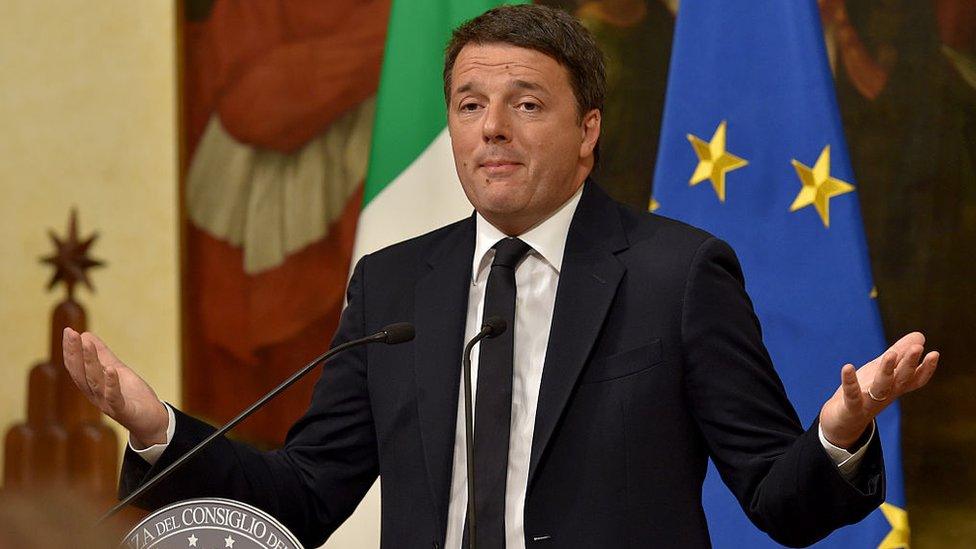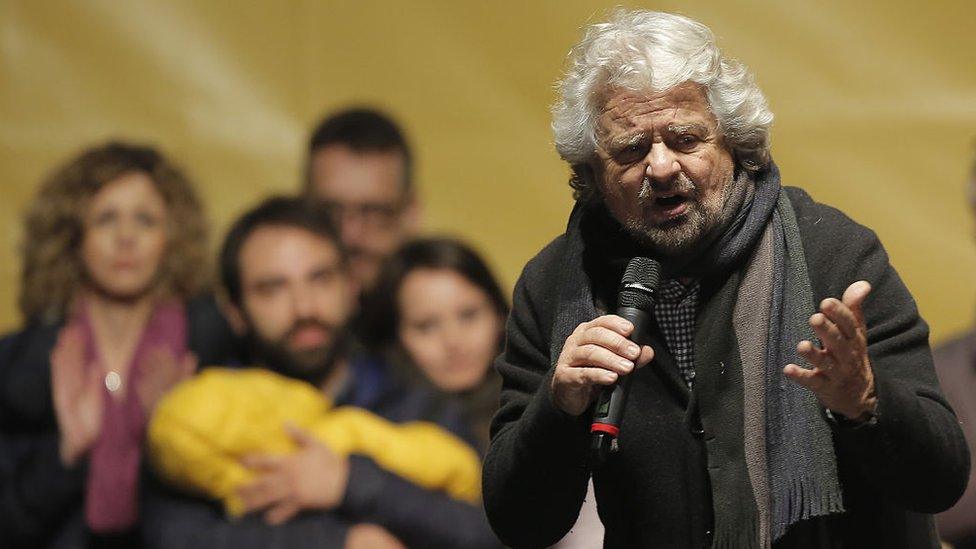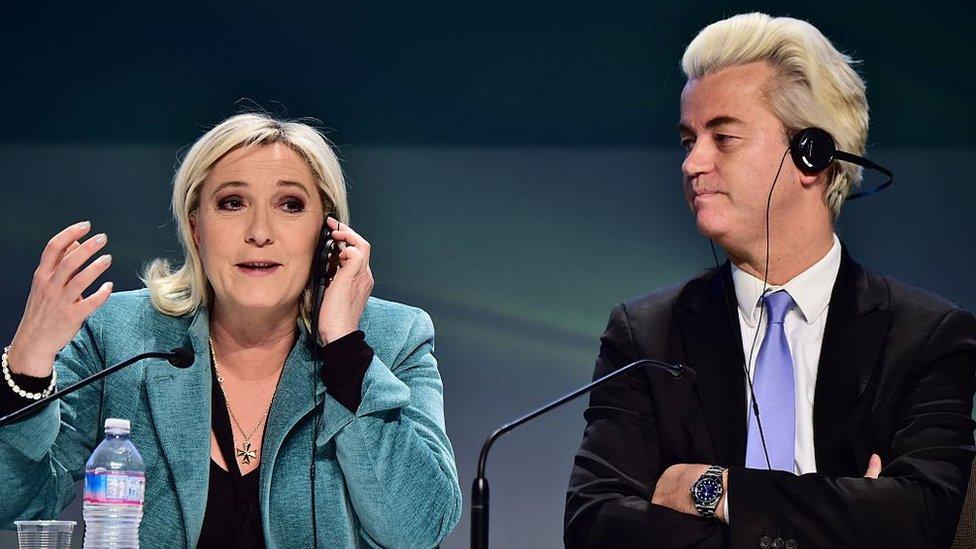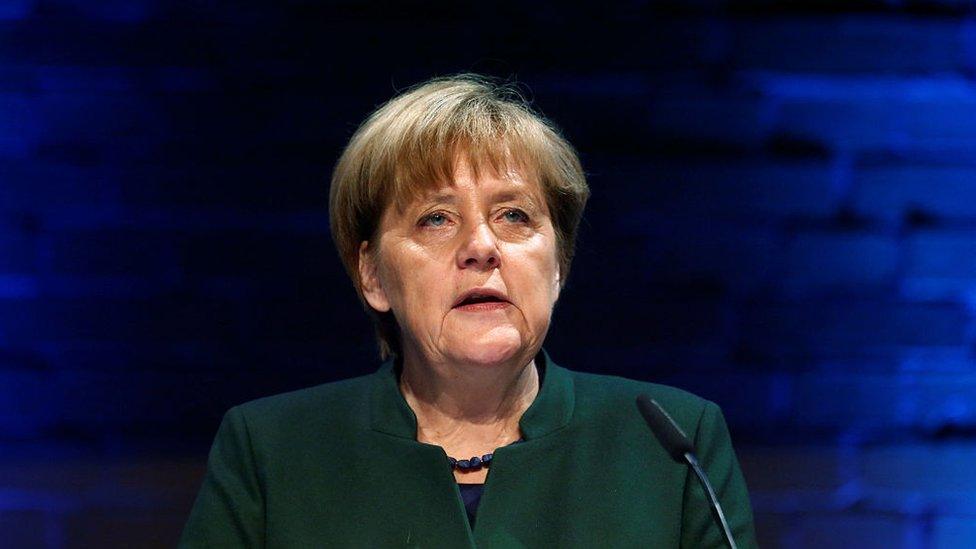Could the European Union fall apart?
- Published

It has been a dreadful year for the European Union. It has just got a lot worse. Next year could transform a looming existential threat into a terminal reality. The end of a joint 60-year project to transform the politics of an entire continent is now a distinct possibility.
Some would greet the prospect with glee, others with horror. But few have thought through what it would mean if the pillars came crashing down.
The Italian vote means, as here, a populist, anti-establishment surge has defenestrated a prime minister.
There, as here, a new prime minister may be anointed without the bother of a general election. There, unlike here, that would probably further stoke the fires of popular discontent.
Either way, sooner or later (which means in 2018) the main opposition, the Five Star movement, could be elected promising a referendum on membership of the euro, if not the European Union itself.
The EU was hardly in a self-confident, ebullient mood in the first place. The continent's economy still stutters. The euro crisis returns with the wearing familiarity of a pantomime villain.
Members question its other great project, the common borderless area, in the light of the migrant crisis. Now this, the second EU straw in a populist gale that will blow throughout next year.
And Italy was the birthplace of the union, where the Treaty of Rome was signed in 1957.

Could Italy's Five Star Movement and leader Beppe Grillo win a general election?
The UK leaving the orbit of the European Union is one thing. There's no denying Brexit was a serious smack in the face for the EU. But however unexpected, in a sense the other members were long-braced for such a blow.
We were a late addition, always rather reluctant, still part of the solar system but orbiting some where beyond Pluto, not part of the euro, not part of agreements on justice and home affairs, not part of the borderless arrangement.
By contrast, Italy is one of the inner planets.
So is the Netherlands. There, Geert Wilders' Party for Freedom, external is predicted to do well in the elections next year, perhaps with him becoming prime minister. He wants to take the Netherlands, another founder member, out of the European Union, external.
But France is the big one. Most expect the French presidential election to be a play-off between the National Front's Marine Le Pen, external and Francois Fillon, external from the centre right. She has promised the French a referendum on the membership of the European Union. He wants an end to dreams of a federal Europe, external.
The Italians, the French, the Dutch will, over the coming year, raise profound questions about the EU. Its fate will be a, perhaps the, central issue in their elections. The apparent success of hard-right parties will push mainstream parties to consider their more popular ideas.
Italy leaving the euro would be a profound shock to the EU's most important project, but it could survive. But an EU without France and the Netherlands as well as the UK?

Both Marine Le Pen and Geert Wilders could gain power in their respective countries
In theory it could live on without three of Europe's biggest economies, but it would be a very different proposition, an army regrouping in retreat, not a nascent continental superpower on the march.
So far I have ignored the elephant in the room. But these days Germany is not so much the thick-skinned pachyderm, disdainful of the flea bites that irritate lesser beasts.
Nearly all commentators believe Angela Merkel will become chancellor for a fourth term, after taking a bit of battering in the elections. No-one thinks she will lose. But this time last year almost no-one thought Donald Trump would end up as president of the United States.
The hard-right-wing AfD, external poses a serious challenge. While it doesn't formally suggest leaving the EU, it seems many supporters, external and some representatives, external do.
It does want to leave the euro and to return more powers to the nation states: to put Germany first.
Those who believe in the EU are painfully aware of the popular mood, but their response is hardly dynamic. It is standard to call for policies to promote jobs and growth. Or argue that the European Commission should do less, and cut red tape.
But these arguments are hamstrung from the start. The EU has little direct influence over the economy. The activist anger is, in some ways, a response to the Delors Commission of 20 years ago. The commission does do less than it used to, only people don't believe it.

Commentators believe that Angela Merkel will win a fourth term in 2017
There is some fresh thinking: from the soon-to-be-former Italian Prime Minister, the Council President Donald Tusk and the Dutch Prime Minister, Mark Rutte. Their basic argument is that the EU has stumbled because it ran before it could walk.
It abolished internal borders without securing its external ones, external and set up a shared currency without the common tax policy or treasury required to make it function smoothly. But all their answers require more, not less, Europe. They are hardly designed for an easy sell, or to gain traction in today's world.
They are, in a sense, over-earnest, analytical and policy-driven solutions, not grasping that this is about moods and symbols as much as rules and regulations.
Those who do respond by arguing for a looser confederation, like many in Eastern Europe, also want to keep the very bits, such as the single market and subsidies, that do seem to demand common rules and a supranational honest broker like the commission. The logic hasn't been thought through.
It could be these elections will prove a high tide of euroscepticism, and none of the anti-EU populist parties will get anywhere near power. If so, I would suggest when the waters recede the EU will still look a very different place, eroded and fragile in the face of popular obloquy.
If one or more of these elections does deliver a hammer blow, the fracture will spread slowly, incomplete yet utterly chaotic.
We'd have to take seriously the return of a Europe of disconnected nation states, without a single market, with borders, and ask what vestiges of cooperation and common policy would remain.
It would be in tune with the mood across the Atlantic, with talk of trade barriers and an end to internationalism. The meat and drink of Brexit, the debates over customs unions or free trade would become continent wide.
Russia would be exultant and Vladimir Putin would, most likely, have the luxury of picking friends and enemies, rather than facing a bloc imposing sanctions.
But central would be what happens to Germany, for 60 years like a dutifully blinded Samson willingly bound to the pillars of the temple.
The EU was constructed to contain German might, and Germany is now hard-wired to see its destiny as European and multi-national, with a heavy responsibility to find consensus.
That is unlikely to change unless the hard right do come to power. But it is difficult to predict how Germany would lead amid the ruins of a unique and ambitious project in which it invested so much.
- Published30 December 2020

- Published24 September 2015
